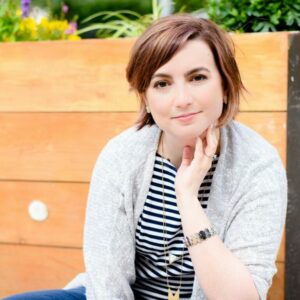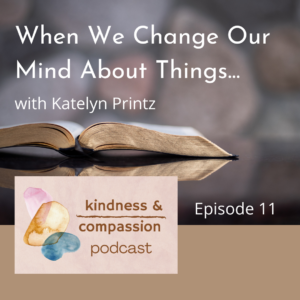 In this episode, Katelyn Printz joins us to talk about the process she went through in changing her mind about some things. Katelyn shares her story about growing up with some fairly narrow conservative Christian views. As an undergraduate in college, Katlyn’s eyes were opened up to various ways of thinking, allowing her to reconsider some of the opinions she had as a child. Katelyn speaks about the importance of allowing your faith to be a continuous process as you grow and learn. Tune in as we chat about the many ways to love and worship and why it’s critical to have kindness and compassion for yourself and others as they make changes to their faith and beliefs.
In this episode, Katelyn Printz joins us to talk about the process she went through in changing her mind about some things. Katelyn shares her story about growing up with some fairly narrow conservative Christian views. As an undergraduate in college, Katlyn’s eyes were opened up to various ways of thinking, allowing her to reconsider some of the opinions she had as a child. Katelyn speaks about the importance of allowing your faith to be a continuous process as you grow and learn. Tune in as we chat about the many ways to love and worship and why it’s critical to have kindness and compassion for yourself and others as they make changes to their faith and beliefs.
Meet Katelyn Printz
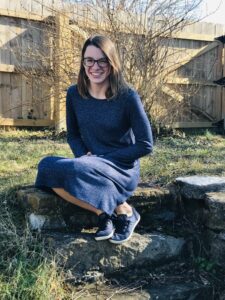
Katelyn is a middle school teacher who has spent the past 5 years teaching science and Bible/Theology classes. She grew up in and attended seminary in a very conservation denomination that did not look fondly on her wrestling with big questions around racism, LGBTQ theology, women in leadership, ect. This led to many months of study and deconstruction of old beliefs. Her process eventually brought her to the Episcopal Church. Leaving her childhood church community has resulted in many difficult conversations with family and friends who disagree with where she has landed. The process of reckoning with hard questions and being pressed towards hard conversations has pushed her to spend lots of time thinking about how to disagree with compassion and kindness. Katelyn lives in Kingsport, TN with her old rescue dog, Buddy.
Rethinking Conservative Christian Views
Katelyn grew up in a very conservative Christian denomination; views were narrow in what was permissible or not permissible. She found a lot of safety knowing where the boundary lines were for right and wrong. However, Katlyn was always curious and had a lot of questions about her ethics and morals. However, she was afraid to be as straightforward about all her questions. Katlyn went to a Christian university, where she was exposed to liturgical-style things for the first time. At university, Katlyn realized that there are Christian people who think differently than the minimal perspective that she grew up with.
Permitting Yourself To Be Patient When It Comes To Faith
Before Katelyn has a conversation with someone else, she has had to learn how to permit herself not to understand something fully. She permits herself to wrestle with her thoughts and allows faith to be a continuous process. You don’t need to have airtight boxes when it comes to faith; this can be a challenging idea to understand. Many people struggle to give themselves grace and compassion. Remember to be patient with yourself as you read and learn. It can be exhausting to undo the beliefs that you have held since childhood. Overall, give yourself permission to have a conversation and say, “I don’t know.”
There Are Many Ways To Love and Worship God
Katelyn was working at a bush hospital in Kenya during college. She enjoyed watching people love and worship God in a way that was just very different from her own. At a Kenyan church, there is a lot of exuberant, joyful dancing. Plus, there is a lot more openness to the supernatural. The activity of angelic or demonic forces is just more prominent in Kenya versus the United States. Watching other people worship with such explosive joy was very beautiful, especially when compared to a formal religious ceremony in America.
Working on Kindness and Compassion With Yourself and With Others
Katelyn is working on showing herself kindness and compassion. There are still a lot of aspects of her theology that she is rethinking. Have compassion for yourself; you don’t need everything figured out. Plus, you don’t need to act like you know exactly what you’re doing. Also, Katelyn makes sure to have kindness and compassion for the people around her. Find the humanity in every person. It’s critical to be kind about accepting change and how slow or fast others are willing to change. Lastly, Katelyn knows when to pull back. If she has an unhealthy conversation, she knows when to stop engaging.
Conclusion
Ultimately, kindness and compassion comes to fruition by being curious about people. As Katelyn points out, when we allow ourselves to get curious rather than defensive, we can have a discourse that is based on compassion. We might not always agree with another’s point of view, but we can still be curious. And you never know… it might just lead to changing you mind about some things…
Gordon (00:00):
Hello, everyone. And welcome again to the podcast. And I'm so glad for you to get to know Caitlin prince Caitlin. Welcome to the podcast.
Katelyn (00:08):
Thank you. B, I'm really excited to be here.
Gordon (00:11):
Yes, yes. And I've gotten to know Caitlin over the last few years, really again, through, through my church context and just conversations we've had about theology and just, um, a lot of the different changes in life that come along and in getting to know Caitlin, I know that she's been on this pretty fascinating journey just with changing her mind about things and changing kind of her view of things, particularly theological, but, um, Caitlin welcome and tell, tell folks a little bit more about yourself and how you've landed, where you've landed.
Katelyn (00:50):
Okay. Well, I grew up in a very conservative, um, Christian denomination, um, very, I guess, narrow in what was viewed as, um, permissible or not permissible. And I just soaked it all up. I think I was a little, um, I rule follower and I found a lot of safety in knowing where the boundary lines were and what was right and what was wrong or what I thought was right and wrong. Mm-hmm,
Gordon (01:39):
Katelyn (01:40):
And, but I've also always been very curious. And so I had a lot of questions and there were aspects of the black and white contrast, I think, to sing right versus wrong, or, um, complicating questions about God that I think have always bothered me and also made me feel a little on the fringes, I suppose, of that, um, church community, um, because my questions maybe introduced, uh, doubt or uncertainty about the strength of my faith. And so I was very curious, but afraid to be as straightforward about all the questions that I had, um, as maybe I, I could have been, I, um, went to a Christian university where I was actually exposed to, uh, liturgical style things for the first time. And that's where I was first introduced to some authors that I now spent more time with.
Katelyn (02:48):
And that started, uh, helping me realize that there are beautiful Christian people who think differently than the very, um, limited perspective. I guess I had known up to that point. I really loved theology and I wanted to do something in the field of theology, but my church upbringing top that women could not be ordained or hold any kind of position of leadership. And so after I finished college, I did go to seminary, but not with the
Gordon (03:41):
Katelyn (03:58):
Hmm. Um, to be honest, it started with beliefs around, um, racism and white privilege. So even when I was still very deep in the conservative world, I started reading, um, Austin chaning brown was the first book I read. I'm still here. Mm-hmm
Gordon (04:51):
Mm-hmm
Katelyn (04:52):
Moved in the world, I guess. And that led to questions around, um, sexuality was next, I think
Gordon (06:00):
Right?
Katelyn (06:01):
Yeah.
Gordon (06:02):
Yeah. So as, as your, as your theology and it might be helpful for us to maybe tell folks that are listening, you know, when, when, when we speak of theology, what comes to mind for you? Because I think that's at least in my mind that has a lot to do with why people believe what they believe
Katelyn (06:23):
Mm-hmm
Gordon (06:58):
Right, right. Mm-hmm
Katelyn (07:10):
I think now the question I tried to ask is does this look or sound like love, um, and kind of work from there, I've really come to realize that there was talk of grace before. Um, but I don't think I really wrestled with the expansiveness of it and the welcomingness or hospitality of God and the way that his people can mirror that. I suppose.
Gordon (07:47):
Mm-hmm
Katelyn (08:30):
Well, it's tricky and I don't necessarily think I have it figured out or that I've done it right each time
Gordon (08:37):
Mm-hmm
Katelyn (08:38):
Um, but I think foundational to, before I could go into a conversation with someone else was really learning how to grant myself permission, to not understand something fully permission, to wrestle and to allow faith, to be a continuous process of trying to draw near to God. And it not meaning that I have my airtight boxes of this means this, and this means that mm-hmm
Gordon (10:09):
Right. Right.
Katelyn (10:11):
So that's the hardest part I think. And what I'm still working on when it came to O conversation with other people like my parents or family members, who've watched me kind of go through this changing of my mind. Um, I think I've also had to work on, um, what that passage just says, like always being ready to have an answer for the hope that's in you or whatever. Mm-hmm
Gordon (11:05):
Katelyn (11:07):
And rethinking my beliefs on things made that aspect very difficult. And so also trying to give myself permission to have conversations and then say, I don't know, mm-hmm
Gordon (11:41):
Yeah, yeah. That's a, yeah. And that's a, I think a, a struggle for a lot of people is, is that being able to, in many ways, by doing that in the way that you described is really kind of an act of kindness and compassion, not only towards yourself, but also to the other person, cuz I think a lot of times we can get into heated these discourse where things mm-hmm,
Katelyn (12:37):
I've tried to kind of in myself and in the person that I'm talking to try to tease out, is this curiosity or is this defensiveness mm-hmm
Gordon (13:19):
Right, right. Yeah. Well, I, to change gears a little bit, Caitlin, one of the things that I know just about your, your background is that you spent quite some time working as a missionary or mission kind of the mission field, so to speak, how, how did that impact your life and how did that really kind of change your theology to some degree?
Katelyn (13:47):
Well, so I was working at a Bush hospital in Kenya, in the summers, in between my college years. And then once again, after college and it was a, a Christian organization, um, I really think that it, this was before like I really started deconstructing or had left my previous sound this before all of that. But I think the biggest thing I took away from it was watching people love and worship God in a way that was just very different from mine. So Kenyan church is this like exuberant, joyful dancing, extremely long, like the whole day experience. Um, mm-hmm
Gordon (15:26):
Katelyn (15:27):
Yeah. And very like we sit in our chairs and we sing kind of softly
Gordon (15:33):
Mm-hmm
Katelyn (15:35):
Yeah,
Gordon (15:36):
Yeah. It's uh, I've I've heard it referred to as, uh, the, the happy clappy versus the frozen chosen. Yeah. Yeah. So yeah, yeah. Yes. So yeah. It's well, it's, it's been nice and as be in being, uh, CA's friend and just being connected with her to see, to see your growth in this and what you're discovering about yourself and just how you live into that live into all of this with kindness and compassion and yeah. So what, what sort of maybe kind of, um, closing thoughts do you have just about, about that? Um, you know, how are you, how do you see yourself living into kindness and compassion through this, these changes you're going through with changing theology thing, changing beliefs and, and all of that.
Katelyn (16:28):
Mm-hmm,
Gordon (17:05):
Katelyn (17:07):
And then I guess for, uh, dear friends around me, just having kindness and compassion around their, um, the rate at which they themselves want to change or are accepting my change. I, I find myself frustrated sometimes and I have to remind myself that, you know, just a few months ago, that's exactly where I was or what I was thinking. Mm-hmm
Gordon (18:07):
Mm-hmm
Katelyn (18:09):
Yeah. And then knowing when to pull back and be like, this is not a, a beneficial or a healthy conversation right now. I love them still, but I, we cannot, I don't, I don't want to engage in it in an angry or hurtful
Gordon (18:30):
Mm-hmm
Katelyn (18:31):
Of course.
Gordon (18:32):
Yeah, yeah, yeah, yeah. I love that. And I think it's, um, I think it's, for all of us, it's an ongoing, it's an ongoing kind of thing, ongoing journey and struggle to really kind of, to, to wrestle with these, these deeper issues. Um, I'm always, always reminded in, in thinking about people that go through kind of changes in their, their belief system or whatever is, um, uh, J Jacob wrestling with the angel, which is an image out the Bible. And I always think of it as Jacob wrestling with God, which might, might not be literally cardiac, but that's how kind interpret that that particular scripture in the Bible is, is that I think God wants us to wrestle with these things. And I think to be able to, to know ourselves better and also know each other better is, is our wider communities to be able to, to talk about these things and understand 'em and, uh, you're exactly right.
Gordon (19:33):
There are no clear black and white answers and that's where we get, I think can get into the weeds. Mm-hmm
Katelyn (20:49):
Yeah. Thank you, Gordon. And thank you for your role in helping me rethink some things.
Gordon (20:55):
You're welcome. You're welcome. Mm-hmm
Sign up to receive email updates
Enter your name and email address below and I'll send you periodic updates about the podcast.
About
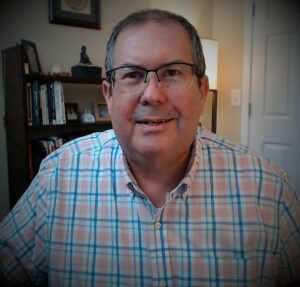
L. Gordon Brewer Jr., LMFT |Podcast Host – Gordon has spent his career in helping professions as a licensed therapist, counselor, trainer, and clergy person. He has worked with 100’s of people in teaching them the how to better manage their emotions through self-care and the practices of kindness and compassion. Follow us on Instagram and Facebook . And be sure to subscribe to our newsletter.

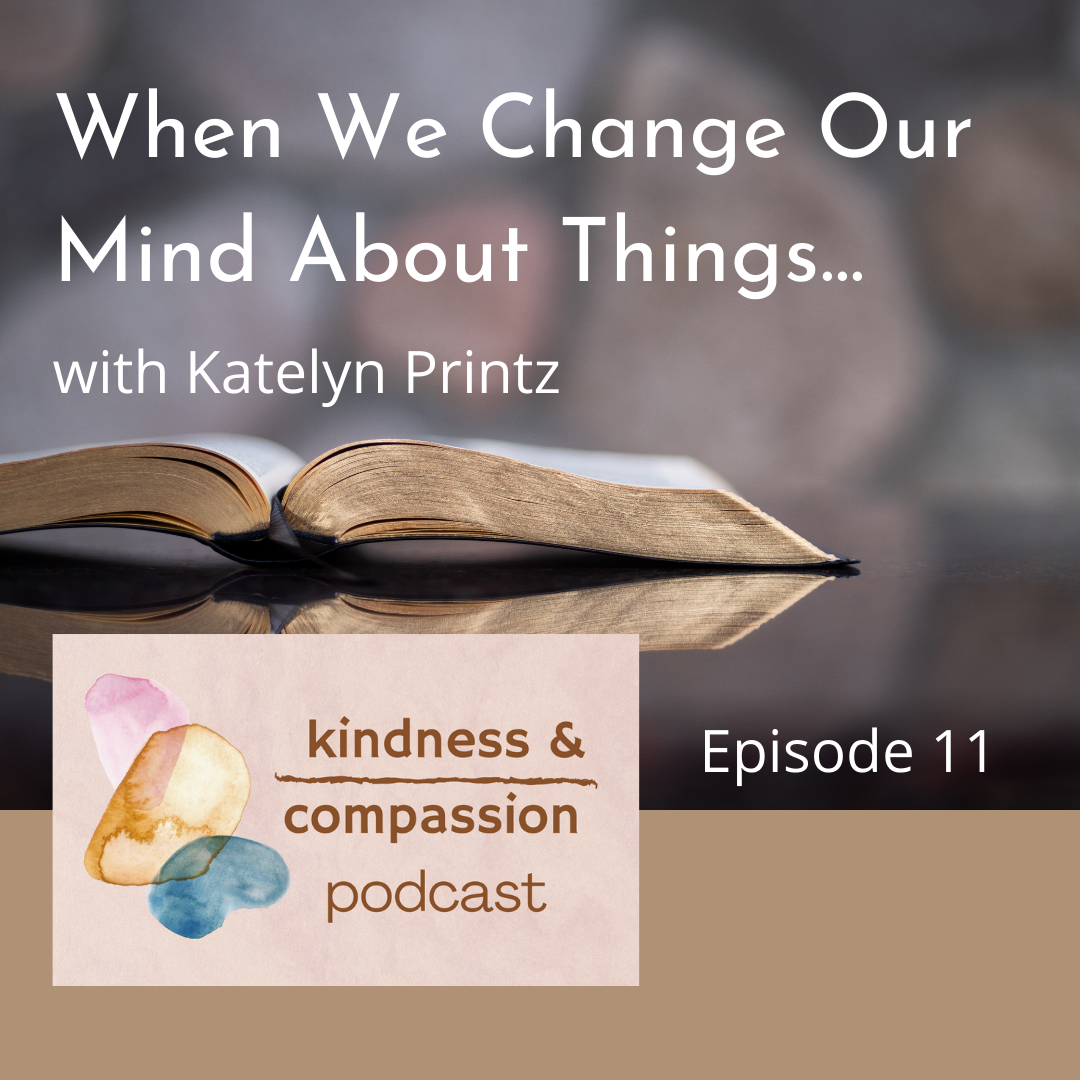
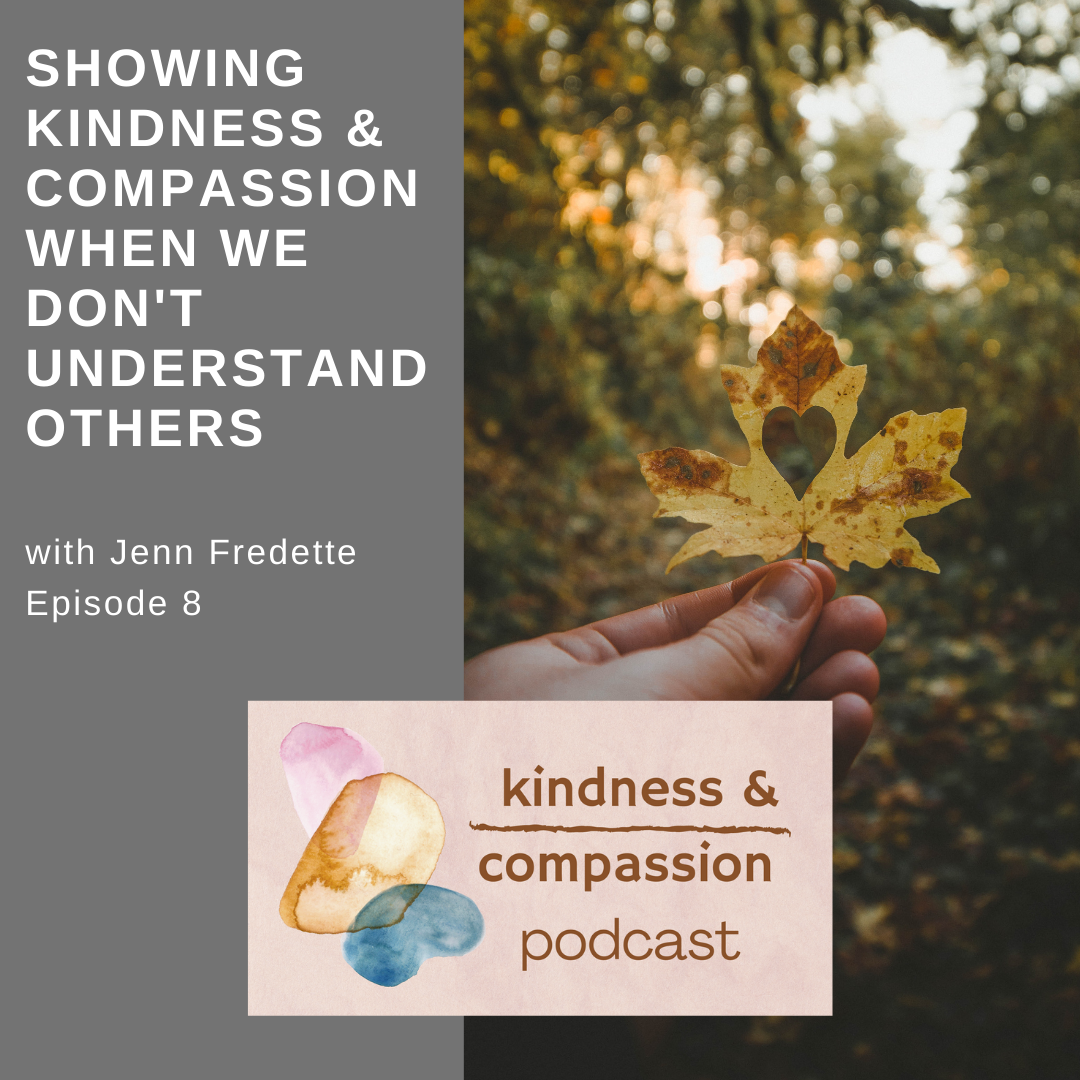
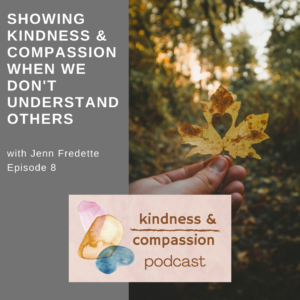 In this episode Gordon talks with Jenn Fredette, LPC, MA, MDiv, about being vulnerable, being human and coping with people we just don’t agree with. Jenn shares her experience of having come from a very conservative religious background (“cult”) and the ways in which she has grown and healed since then. Jenn and Gordon also talk about how being present with and for people is an act of kindness and compassion.
In this episode Gordon talks with Jenn Fredette, LPC, MA, MDiv, about being vulnerable, being human and coping with people we just don’t agree with. Jenn shares her experience of having come from a very conservative religious background (“cult”) and the ways in which she has grown and healed since then. Jenn and Gordon also talk about how being present with and for people is an act of kindness and compassion.